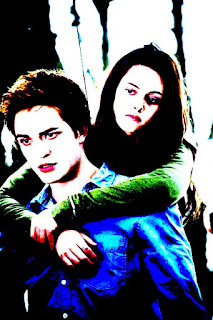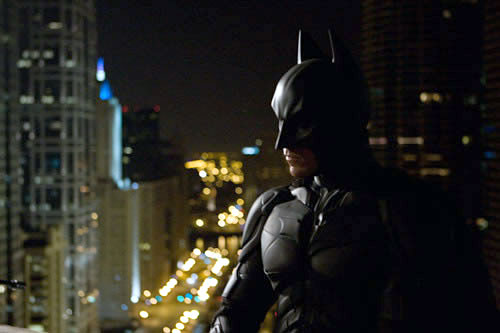America is melting. It is a giant mushroom cloud of stale credit, foreclosures, and vaporized 401K's. Wall Street has transformed into a leviathan bowl of Jell-O in which financial brokers flail, wearing those little orange floaties and go down with the proverbial ship as the orchestra plays "Nearer to Thee." Leonardo diCaprio can be found whispering endearing words to the Kate Winslet's of the world; Frodo can be found wandering the streets looking for Mount Doom.
So, what's a body to do when there is little to celebrate, little funding to attend keystone cultural films such as Nights in Rodanthe and Twilight, where teeny-bopper vamps run around in the forest making doe-eyes at each other? Why, very little, of course. But American film has done much of the same. Taken hard times, made them a little less hard. Or just added cushiony fluff to pad the fall. Such economic destitution call for one of two things: one, a lot of comfort in the form of alcoholic beverages. Two: films to make the general populous forget that they might be begging for spare change on Delancy St. next week. So, here are five films that either embrace or deny the need for the god of green, the root of all evil, and, the unobtainable.
1. Golddiggers of 1933 (1933)
What
 better way to celebrate monetary prosperity and the end of Herbert Hoover's asinine presidential rule? By celebrating capitalism, of course! With show tunes! And Pig Latin! In Mervyn LeRoy's musical romp, veteran showgirl Trixie Lorraine (Aline MacMahon) and her roommates are simply drowning in debt. The bright lights of Broadway have lost some of their gleam, and no production can seem to last past rehearsal. There's just no money. Until, of course, the dapper Warren William (J. Lawrence Bradford) saves the angry producer (Ned Sparks) from an embolism by writing a winning show, and magically funding it. The story is pure fluff-sugar and spice and everything with a price-there's socioeconomic wars between William's family when his older brother finds out Warren is courting a Broadway showgirl. Or that he's using his trust fund to support the frivolous "Gold diggers."
better way to celebrate monetary prosperity and the end of Herbert Hoover's asinine presidential rule? By celebrating capitalism, of course! With show tunes! And Pig Latin! In Mervyn LeRoy's musical romp, veteran showgirl Trixie Lorraine (Aline MacMahon) and her roommates are simply drowning in debt. The bright lights of Broadway have lost some of their gleam, and no production can seem to last past rehearsal. There's just no money. Until, of course, the dapper Warren William (J. Lawrence Bradford) saves the angry producer (Ned Sparks) from an embolism by writing a winning show, and magically funding it. The story is pure fluff-sugar and spice and everything with a price-there's socioeconomic wars between William's family when his older brother finds out Warren is courting a Broadway showgirl. Or that he's using his trust fund to support the frivolous "Gold diggers."In the end, you have a feel-good lavish production that uses appoggiatura and bobbed hair to coat the economic horrors of the Great Depression. Which could be why the studio adds a politically charged number to the end of the film, "My Forgotten Man," a mournful ballad about the faceless thousands still stuck in breadlines, still scarred from war. A true show stopper.
2. Mari
 e Antoinette (2006)
e Antoinette (2006)Ten minutes watching Sophia Coppola's brazen rock'n roll rendition of the lavishly opulent French monarch will make you want to eat cake in Versailles, too. Although it was greeted with less than stellar acclaim, Coppola's artistic ambition is worth its weight in gold. You know the story.
Self-involved teenage queen forced to marry young, produce an heir, discovers the pleasures of carnal affection. Though chocabloc full of anachronisms (see: a pair of blue Converse All-Star's in Marie's dressing room), it's a fantastic mix of wealth and waste. Not to mention, several dozen pairs of custom-made Manolo Blahniks.
3. Little Shop of Hor
 rors (1986)
rors (1986)Ever want to get rich quick? Try stumbling across a curious plant in Chinatown after a total eclipse of the sun, bring it back to your failing floral business, and see where that takes you. The only snag is, the plant doesn't have a taste for Miracle Grow: the only fodder it fancies is the kind with platelettes and leukocytes - yes, folks - blood. Such is the woeful tale of Seymour Krelborn (Rick Morranis), a down-and-out orphan who was taken in by the surly florist, Mr. Mushnick (Vincent Gardenia).
Turns out, this bloodthirsty plant, christened the Audrey II after Morranis' love interest (the wonderful Ellen Greene), is more than he barganed for. Morranis nurses the fledgeling plant as much as he can, literally giving his lifeblood for the sake of the plant that's bringing so much publicity to the small florist. So, Seymour is bloodless and spineless, letting Audrey slip through his awkward finger to the clutches of the maniacal dentist, Dr. Orin Scrivello, DDS (Steve Martin). Audrey II needs blood: Seymour needs Audry I: Dr. Orin Scrivello, DDS is full of blood. You see where I'm headed?
One may argue this little gem of a musical is not specifically about economic crisis. But it's about slumming it, finding a way, and has a nifty paralell to the consequences of unbridled addiction. What's not to love?
So tighten your belt, dig out your library card, and rent away, these movies that make you feel wealthy...at least, in the intellectual sense.
Quote of the Day: Seymour: The Audry II isn't a healthy girl.
Mr. Mushnik: Strictly between us, neither is the Audrey I.














